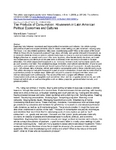- DSpace Home
- →
- Channel Islands
- →
- Academic Affairs
- →
- Faculty Scholarly and Creative Activities
- →
- Francois, Marie
JavaScript is disabled for your browser. Some features of this site may not work without it.
| dc.date.accessioned | 2009-02-04T22:41:59Z | en |
| dc.date.accessioned | 2009-02-04T22:41:59Z | en |
| dc.date.available | 2009-02-04T22:41:59Z | en |
| dc.date.available | 2009-02-04T22:41:59Z | en |
| dc.date.issued | 2008-01 | en |
| dc.date.issued | 2008-01 | en |
| dc.identifier.citation | Francois, Marie. The Products of Consumption: Housework in Latin American Political Economies and Cultures. History Compass. v. 6 no. 1: 207-242. | en |
| dc.identifier.citation | Francois, Marie. The Products of Consumption: Housework in Latin American Political Economies and Cultures. History Compass. v. 6 no. 1: 207-242. | en |
| dc.identifier.issn | 1478-0542 | en |
| dc.identifier.issn | 1478-0542 | en |
| dc.identifier.uri | http://hdl.handle.net/10139/592 | en |
| dc.identifier.uri | http://hdl.handle.net/10139/592 | en |
| dc.description.abstract | Exploring links between housework and larger political economies and cultures, this article surveys discussions of paid and unpaid domestic labor in mostly urban settings in Latin American historiography. The focus is on inter-related questions: Who does housekeeping work? What is the nature of the work? What do those who do housework produce? Age, class, ethnicity, and gender intersect in housework, as it constructs identities drawn on specific cultural landscapes in diverse colonial and postcolonial settings. Bridging literature on unpaid work done in the home by wives, other female family members, and male and female slaves and literature on the paid work of domestic male and female servants of multiple ethnicities, this article argues that housework is not ‘naturally’ women’s work, but has been constructed as such unevenly over time. The simultaneous legal, economic, and cultural subordination of women and non-whites under patriarchal colonial and liberal regimes that devalued housework – despite depending on it – left arduous, labor-intensive, skilled, and creative consumption work to these subordinated groups. This article also argues that while housework is part of social reproduction, it must also be understood as a productive process in multiple ways. While who did paid housework changed over time, wives and mothers did unpaid work continuously. The nature of the work changed with different contexts. Consumption work produced tangibles such as tortillas, clean clothes, elegantly served tables, and well-turned-out individuals, as well as intangibles such as status, prejudice, gendered labor markets, and gendered politics. | en |
| dc.description.abstract | Exploring links between housework and larger political economies and cultures, this article surveys discussions of paid and unpaid domestic labor in mostly urban settings in Latin American historiography. The focus is on inter-related questions: Who does housekeeping work? What is the nature of the work? What do those who do housework produce? Age, class, ethnicity, and gender intersect in housework, as it constructs identities drawn on specific cultural landscapes in diverse colonial and postcolonial settings. Bridging literature on unpaid work done in the home by wives, other female family members, and male and female slaves and literature on the paid work of domestic male and female servants of multiple ethnicities, this article argues that housework is not ‘naturally’ women’s work, but has been constructed as such unevenly over time. The simultaneous legal, economic, and cultural subordination of women and non-whites under patriarchal colonial and liberal regimes that devalued housework – despite depending on it – left arduous, labor-intensive, skilled, and creative consumption work to these subordinated groups. This article also argues that while housework is part of social reproduction, it must also be understood as a productive process in multiple ways. While who did paid housework changed over time, wives and mothers did unpaid work continuously. The nature of the work changed with different contexts. Consumption work produced tangibles such as tortillas, clean clothes, elegantly served tables, and well-turned-out individuals, as well as intangibles such as status, prejudice, gendered labor markets, and gendered politics. | en |
| dc.language.iso | en_US | en |
| dc.language.iso | en_US | en |
| dc.publisher | Wiley Blackwell | en |
| dc.publisher | Wiley Blackwell | en |
| dc.subject | gender studies | en |
| dc.subject | historiography | en |
| dc.subject | cultural production | en |
| dc.subject | gender studies | en |
| dc.subject | historiography | en |
| dc.subject | cultural production | en |
| dc.title | The Products of Consumption: Housework in Latin American Political Economies and Cultures | en |
| dc.title | The Products of Consumption: Housework in Latin American Political Economies and Cultures | en |
| dc.type | Postprint | en |
| dc.type | Postprint | en |
| dc.contributor.csuciauthor | Francois, Marie Eileen | en |
| dc.contributor.csuciauthor | Francois, Marie Eileen | en |
Files in this item
This item appears in the following Collection(s)
-
Francois, Marie [1]

